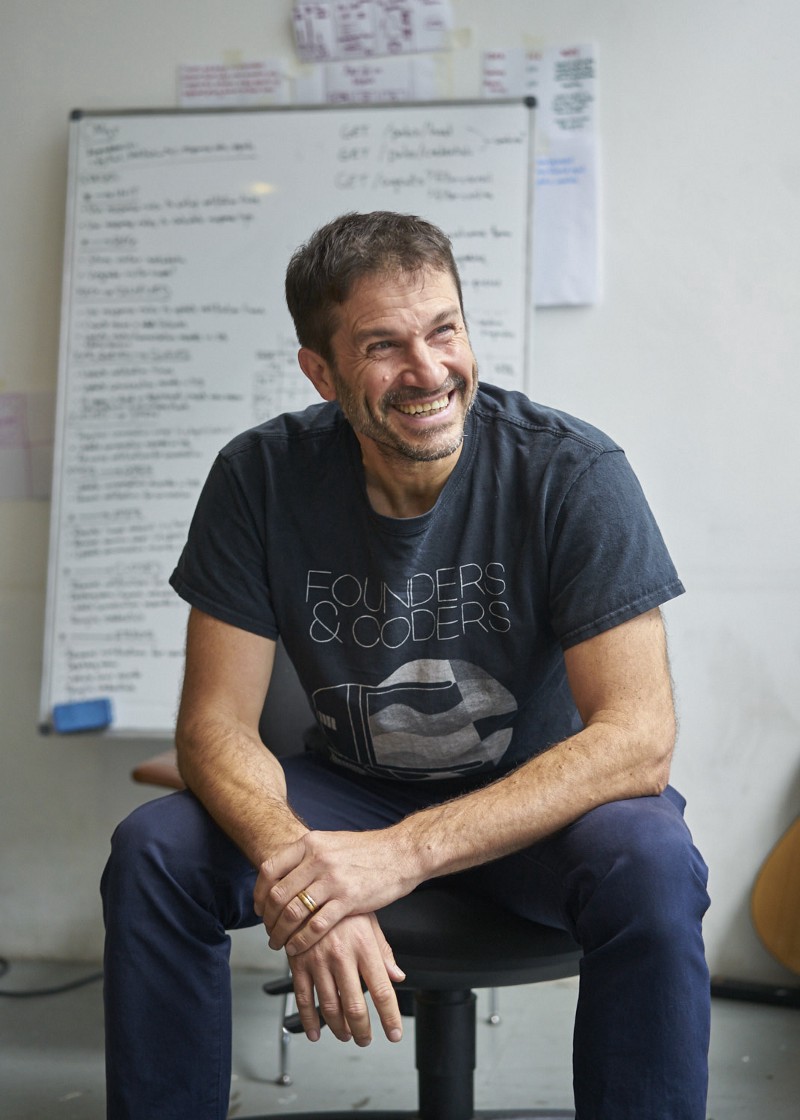by Rebecca Radding
How to run free, peer-led coding bootcamps - an interview with Dan Sofer
Dan Sofer talks about running free, peer-led coding bootcamps in London and Gaza and why he loves working with nonprofits
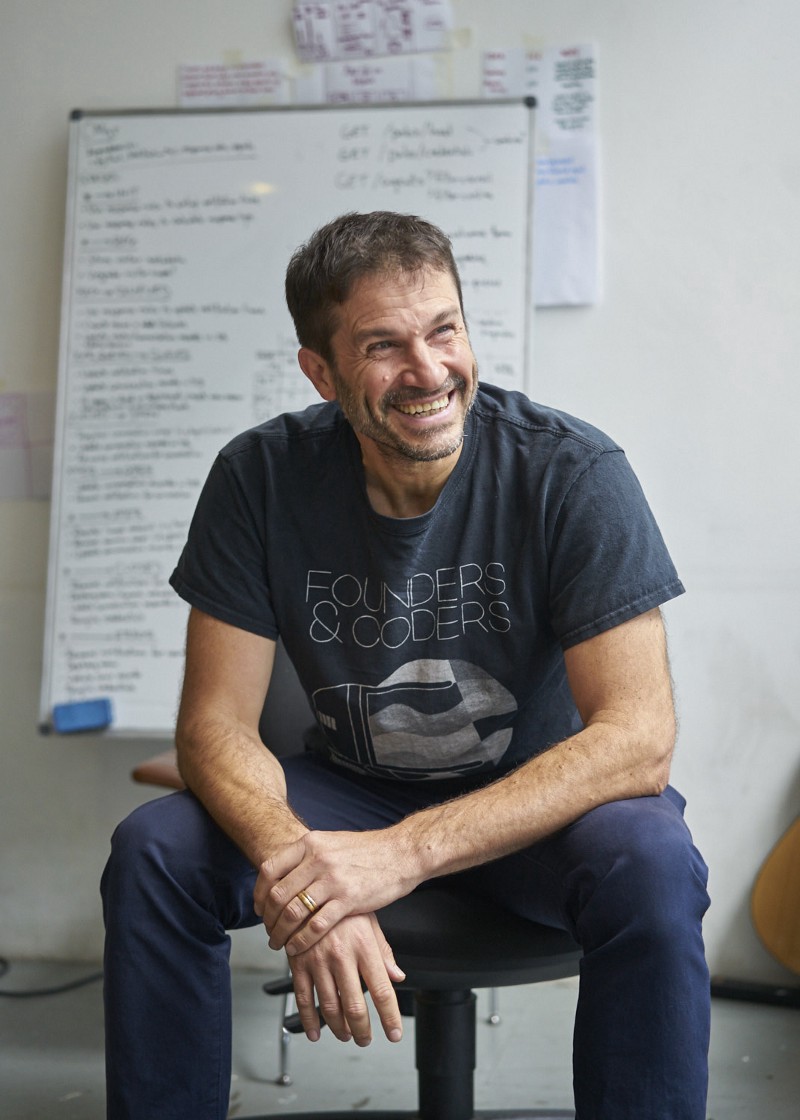
I first met Dan in August 2016 at the arrivals terminal of Ben Gurion Airport in Tel Aviv. He’d flown to meet me after my husband, Tony, who’d been living in Jerusalem, read about London-based Founders and Coders and wrote to Dan to see if he’d be interested in running a similar peer-led training programme with the Palestinian community. That meeting was, as Humphrey Bogart said in Casablanca, “the beginning of a beautiful friendship.”
Since that first meeting, we’ve started two new Founders and Coders programmes together, in Nazareth with the support of the British government and in Gaza, in partnership with Mercy Corps. I recently sat down with Dan at Space4 in Finsbury Park, the home of Founders and Coders CIC, to chat a bit about the early history of Founders and Coders and where the organisation is going next.
The space was buzzing. Students from FAC14, the fourteenth cohort since Founders and Coders began four years ago, are preparing to host clients for a workshop as part of our Tech for Better programme, with the support of mentors from the previous cohort, and their course facilitator, who is a part of InFact, a cooperative based in the coworking space next to the classroom.
So here is how the interview went…
Rebecca: Dan, there’s a lot of energy in here! Should we move somewhere calmer?
Dan: And leave my favorite place in all of London? No way!
Rebecca: In that case, let’s talk about what’s going on in here. I’m looking around and I see something surprising for a tech workspace: more women than men.
Dan: That’s right. For the last two years, over half (57%) of our students have been women.
Rebecca: Is that intentional?
Dan: Absolutely. Inclusion is one of our core values at Founders and Coders.
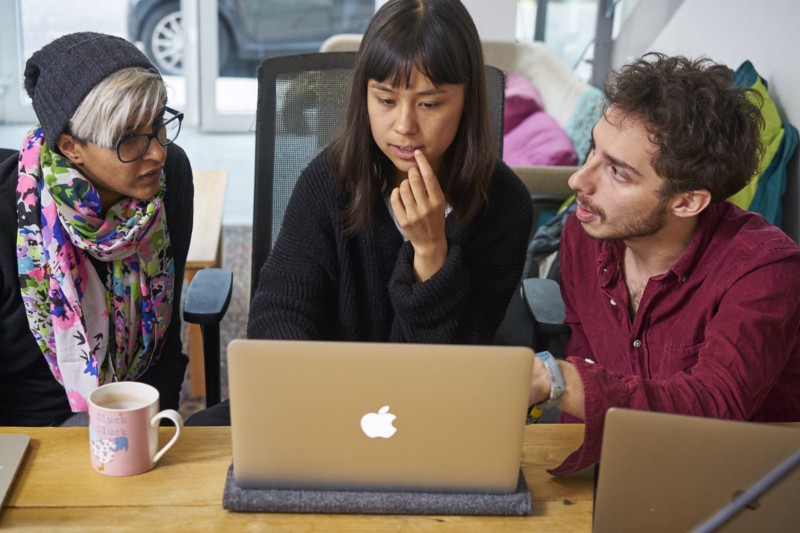
Rebecca: I can’t wait to hear more, but to start, could you take us back to what you were doing before Founders and Coders?
Dan: Well, I’ve been in web publishing for over twenty years. I’ve done just about everything, from programming to project management to business development. For several years, I worked as a project manager on the London Olympics websites. When that ended, I decided to spend some time updating my technical skills, which had got a bit rusty.
In the spring of 2012, the online platform Coursera launched, and the very first offering was a course on machine learning with Andrew Ng, which I started but didn’t finish. Though I was interested in using the internet to self-study, I found it a bit boring to learn on my own.
The next course I took was on game theory, and I decided to organise a meetup of other people taking the course in order to encourage myself to complete it. Four of us met regularly at the British Library until we finished the course.
That experience was transformational. I so enjoyed the combination of a structured curriculum with studying with a group of people who shared my motivation and level of commitment. All through 2013 - it kind of took over my life - I was taking courses on Coursera and also on the edX platform, which launched around the same time. Everything from matrix algebra to startup engineering to courses on functional programming in Scala, and cryptography.
We had been meeting at the British Library, but it’s a public space so we couldn’t just camp out there indefinitely. I started looking for something a bit more permanent and more conducive to peer-led study, which led me to being offered a classroom space by Camden Collective late in 2013, where I held the six-week pilot course that became Founders and Coders: me, fourteen students, and two courses on Udacity.
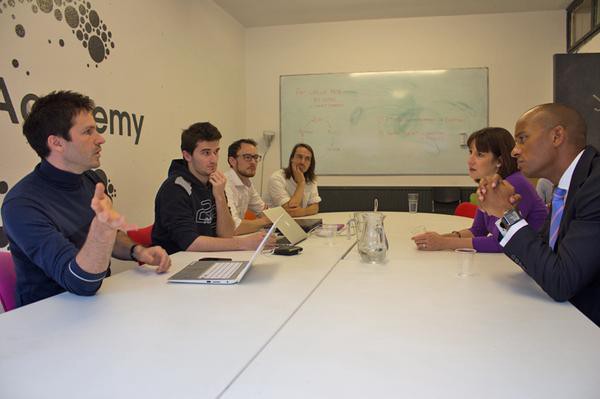
Rebecca: Why web development?
Dan: Well, it’s one thing to have a peer-led learning programme that’s just about people discovering topics they’re curious about, but it was clear to me that it would be more powerful if the learning was vocational and could lead the participants to greater employment opportunities.
Coding bootcamps — the idea that you could take people from diverse backgrounds, give them a grounding in web development, and then help them find work in the job market — had already emerged as a model, and I saw that what I was doing would fit well into that structure.
What was true then is still true now: there are a lot of junior developer roles, and there is an acute shortage of people capable of taking on those roles.
Rebecca: You say you sort of stumbled into peer-led learning. But there’s quite a literature on the subject.
Dan: You’re right. Until I discovered Coursera and the delights of peer-led learning, I don’t think I’d been paying a lot of attention to different pedagogical models. But once I discovered peer-led learning as a model that worked really well for me, I then became curious about who else was doing interesting stuff.
There were a couple of important influences on the early years of Founders and Coders. I found Sugata Mitra’s “hole in the wall” experiments fascinating. You might have heard of it — he gave a well known TED lecture on the subject. He set up a computer in a kiosk in a wall in a slum in Kalkaji, Delhi and children were allowed to use it freely. He then documented how street children came up to it and taught themselves and each other in the absence of any classroom environment. From that experiment he has developed a pedagogy around giving children overly-ambitious projects, putting them in teams, and letting them get on with it without a lot of direction.
Another influence was Ivan Illich’s Deschooling Society, which I’d actually read previously. Illich, who was writing in the Sixties, describes something he calls “learning webs,” where libraries maintain a database of people’s learning preferences to facilitate a process he called peer matching, in which a person goes to a public library and this database matches them with someone somewhere else in the city who shares their interests and passions. It was a sort of dating service for people wanting to peer-learn.
Rebecca: So in a sense, the early days of Founders and Coders were a kind of learning laboratory.
Dan: That’s one way to put it! By the middle of the second programme I was beginning to get disaffected with taking off-the-shelf study materials that were designed for online self-study and putting them into a group environment. People were spending too much of their day with their headphones on listening to materials, which they could have been doing at home.
With the third programme, we dropped the online materials entirely, and I modeled what we were doing a bit more on what Mitra has been doing for years with children. Instead of a well-structured curriculum, each week there would be a different topic and a different project, and I would put them in groups and tell them to get on with it, and that if they discovered anything interesting they should share it with the rest of the groups.
The first year was a mixture of me fumbling around to see what might work and also listening to what the students were saying and trying to find out what they thought worked, and doing a lot of reading around to see what others had done in the past, and realising that actually, there’s a rich literature in peer-led and project-based learning. It’s not that novel, it’s just not mainstream, so you have to dig a bit.
Rebecca: So how have you managed to run a programme without charging fees? Fast forward to 2018, Founders and Coders runs three tuition-free, sixteen-week courses a year in London.
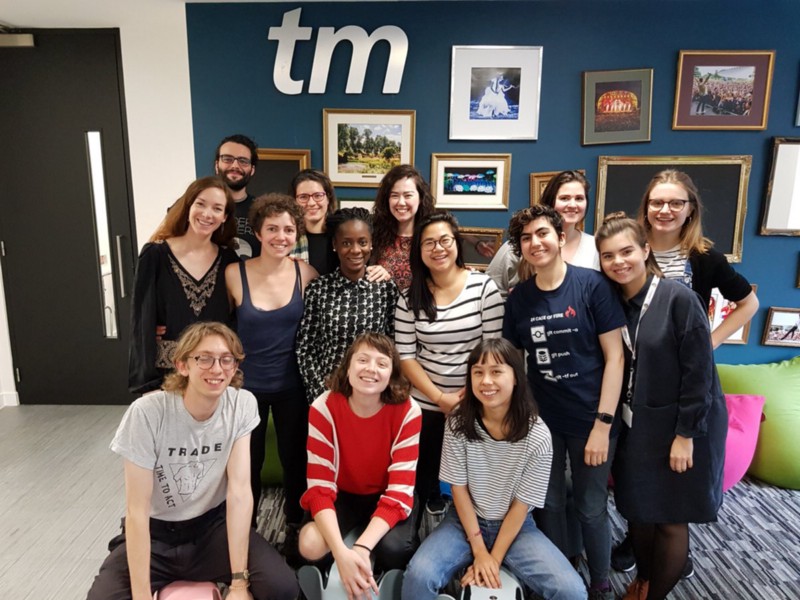
Dan: As a matter of fact, we’ve never charged, but it’s not because I set out to offer a tuition-free course. I started Founders and Coders to further my own self-study, so in the early days there was never a point where I thought, I need to charge these people, because I was grateful for their presence, and how it supported my learning.
When the bootcamp started, my role changed. I wasn’t learning the same material the students were learning, I already more or less knew it, and once the course settled down, the aim was to cover the same material with each cohort. At Camden Collective, I got a lot of support: they provided a classroom for free and paid me a small fee to run the course.
The question of charging the students didn’t really arise until it was clear that the funding in Camden was short-term and we needed to strike out on our own and find another space. I consulted with the students, and my original question to them — after explaining that we would have to start paying some rent, and by the way I would like to start paying myself something — was, what’s a reasonable fee to charge? I got an unequivocal response back, which was that you can’t charge for this, because one of the values is that we’re not paying for a service, we’re coming to be a part of a community, and actually we’d like to contribute back by helping you run the programme.
What emerged out of this dialogue was the idea that instead of charging, students would give back. We then had to develop a model that didn’t require us to charge fees.
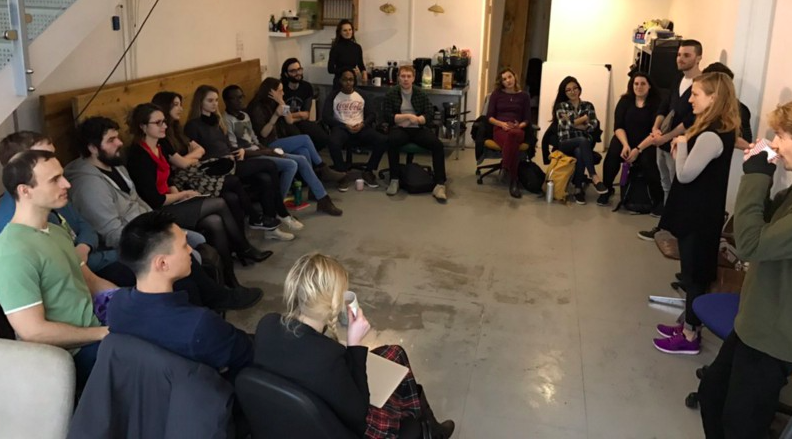
Rebecca: Could you tell us a bit about the commercial model that Founders and Coders London has developed?
Dan: The model in London, where we incorporated as a CIC in 2015, is very simple: we act as an employment agency. Many commercial bootcamps run employment agencies, and for them it’s a way to make a profit. For us, it’s existential. It is the way we cover our costs.
Our programme now is strong enough that we get really good people coming onto the course, who are very focused on the goal of becoming developers, and who are very employable when they graduate. In London there are enough employers who value the quality of students coming out of Founders and Coders that are prepared to pay a fee to us to refer them. That’s how we now support ourselves.
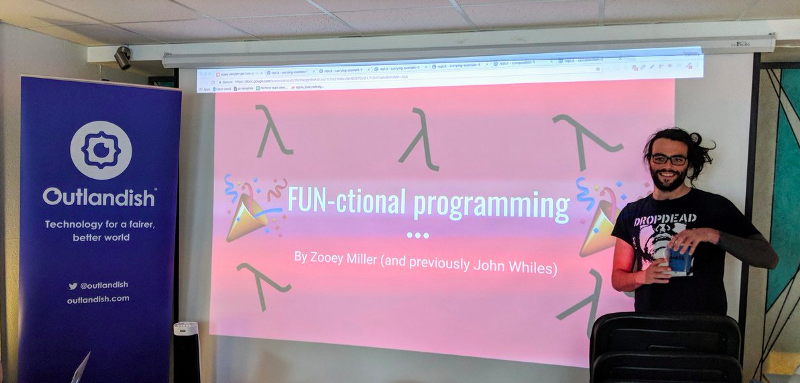
Rebecca: So why would anyone pay for a bootcamp if they could get a free education at Founders and Coders?
Dan: Well, if you’re someone who prefers a structured environment, where you’re supported by skilled educators who know their material and can answer any question you throw at them, then the peer-led environment of Founders and Coders probably wouldn’t work very well for you.
A large part of our ethos is that even if you are picking up material quickly, rather than forging ahead, you should pause and make sure the rest of your team is following. In my experience some people find that deeply frustrating and would rather go at their own pace, not the pace of their group. That might be a reason not to choose us.
Rebecca: You mentioned our ethos. Could you say a bit more about our core values of cooperation, inclusion, and social impact here at Founders and Coders?
Dan: Well, if you’re not doing something for profit, you have to ask yourself why you’re doing it. The first value you mentioned, cooperation, came about as you might guess because peer-led, project-based learning is so central to what we do at Founders and Coders. It’s also central to your employability as a developer. Employers want to hire people who work well on teams and in pairs, and increasingly they are partnering with us because they know that developers who graduate from Founders and Coders are people who know how to do this.
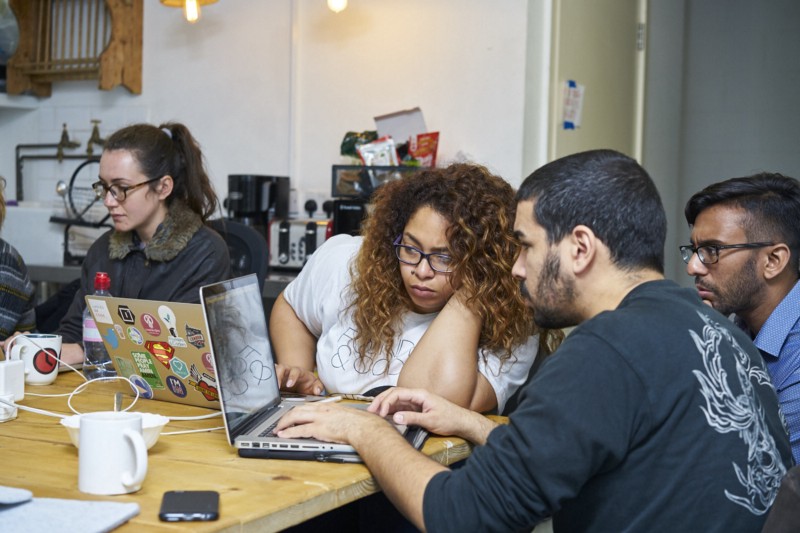
We also run Founders and Coders CIC as a cooperative organisation, with monthly membership meetings of our alumni community and annual general meetings where we collectively set priorities for the coming year, and we’re a member of the CoTech network.
Inclusion is the second one. The tech industry is well-known for being male-dominated and monocultural, so it seemed to me that if we were offering a free programme that this opportunity should be as widely available as possible. In the last two years, 57% of our London intake were women. In our experience, cohorts thrive when teams represent a diversity of experiences and perspectives, providing many opportunities for people to learn new ways of thinking from each other.
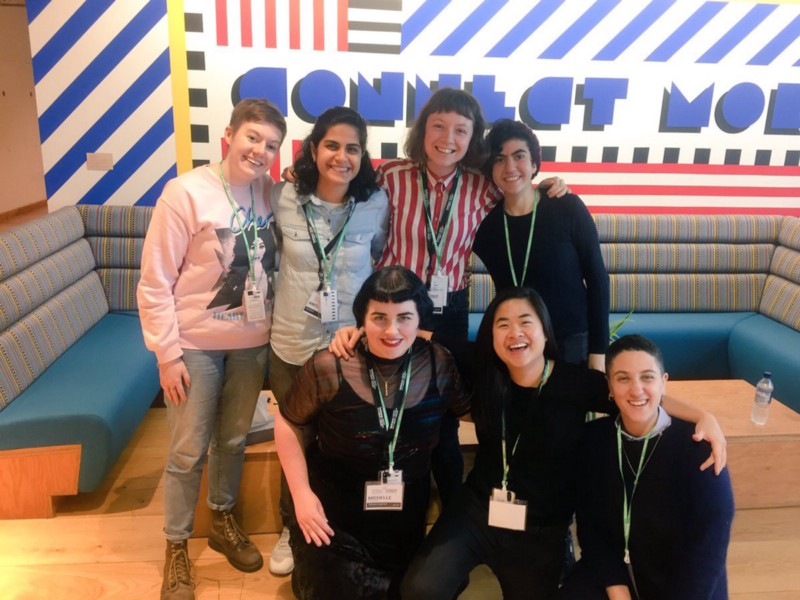
The third value you mentioned, social impact, has become really important to us and is now absolutely front and centre. I would like to say that right from the beginning we wanted to do social impact projects. But at first, we did work for anyone, mainly early stage startups or companies with tiny budgets who needed an MVP.
In the second or third year of our operation, we began making connections with charities like the Anna Freud Centre, public service organisations like the National Health Service, and the Centre for Acceleration of Social Technology, which led to a bit of an epiphany. The problems nonprofits are trying to solve are so much more interesting.
For us it’s been a revelation working with people in the nonprofit sector, trying to help them solve their problems because they just care so much about what they are doing and our students have learned so much from the process of working with them.
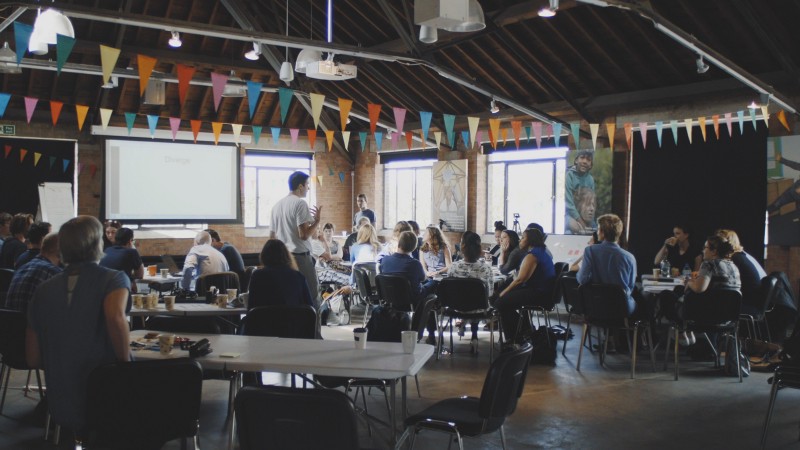
Rebecca: So let’s say I’m a nonprofit organisation and I want to work with Founders and Coders. How do I get started?
Dan: If you’re a nonprofit who wants to work with Founders and Coders, then you should apply to Tech for Better, our pro bono programme for nonprofits to build mobile web apps with our developers in London and Gaza.
Our developers will work closely with you to identify your needs, then build an app that meets them. You’ll also get an experience working with developers, which if you haven’t worked with them before can be almost as opaque as learning to code yourself. This process will help your organisation work out if it’s worth investing in building digital services.
For our developers, the programme is an opportunity to gain experience, improve their employability, and work on projects that make a real difference to people’s lives.
Rebecca: You mentioned that nonprofits who apply to the Tech for Better programme might be working with developers in Gaza.
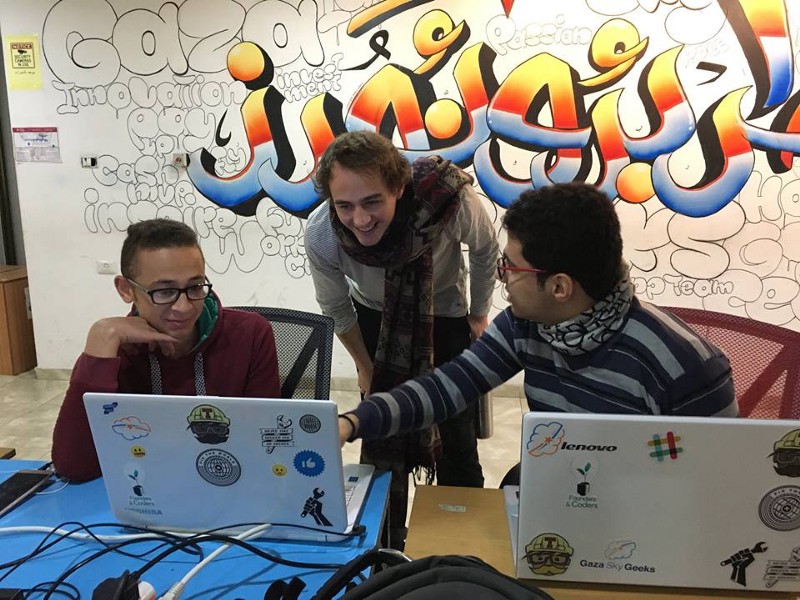
Dan: That’s right. We’ve been on the ground in Gaza for over a year now, where we run a programme in partnership with Mercy Corps. Gaza, of course, is a very different kind of laboratory. Gazans themselves call it the world’s largest open-air prison; in most of Gaza, electricity runs just a few hours a day.
At the same time, working online is for many people the only pathway to gainful employment. So we’re working with Gaza Sky Geeks, a project of Mercy Corps, to develop a structure for peer-led technical training in the technologies and methodologies Gazans need in order to work for clients both inside and outside of Gaza, be it London or Saudi Arabia. And we’re doing it all in English, since that’s the language of the global marketplace. Adapting the London programme to the needs of the Gaza environment has been a challenge, that’s for sure, but the most rewarding one of my life.
Rebecca: What if I’ve got a budget and I want to hire a team of developers in Gaza directly?
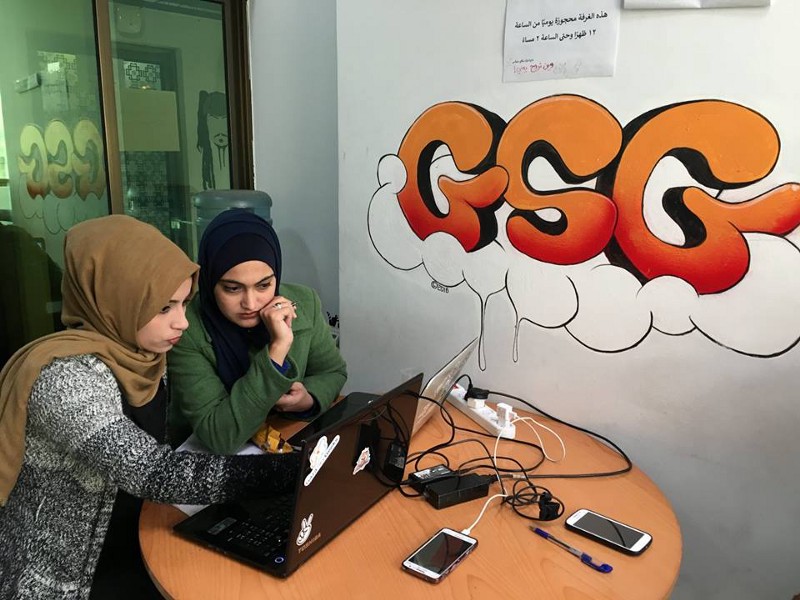
Dan: If you’re looking to build a product, particularly a mobile web app, Gaza Sky Geeks runs a digital agency, and they’ve brought on one of our London alumni as the engineering manager. They already have a number of our graduates working as developers and a growing back catalogue of successful client projects.
Rebecca: And where is Founders and Coders going next?
Dan: We believe in the transformational power of peer-led pedagogy, and we’re excited to be partnering with Mercy Corps on a new programme in the West Bank opening in October, as well as with the British government, with whom we are planning to run a programme in South Africa starting next year.
To learn more about hiring developers in Gaza, visit agency.gazaskygeeks.com.
To learn more about the tuition-free training programme, visit www.foundersandcoders.com.
